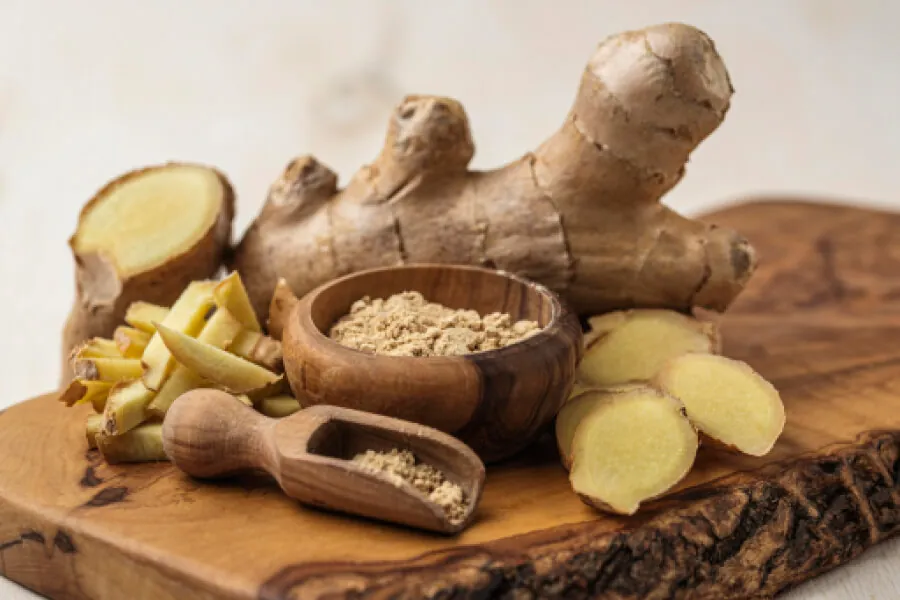Ginger is a spice that has been used for centuries for its medicinal and culinary properties. It is derived from the rhizome (underground stem) of the Zingiber officinale plant, which belongs to the same family as turmeric and cardamom.
It has a pungent, spicy, and aromatic flavor that can add a zing to any dish. But It is more than just a tasty ingredient.
It also has numerous health benefits that can improve your well-being and prevent or treat various ailments.
Here are 8 amazing health benefits of ginger and how to incorporate it into your diet.
Ginger can relieve nausea and vomiting
One of the most well-known and researched benefits of It is its ability to relieve nausea and vomiting. It can help with various types of nausea, such as morning sickness, motion sickness, chemotherapy-induced nausea, and post-operative nausea. It works by blocking the receptors in the brain that trigger nausea and by stimulating the production of saliva and digestive enzymes that can soothe the stomach. It can also reduce inflammation and pain in the gastrointestinal tract, which can contribute to nausea.
To use It for nausea, you can consume it in various forms, such as fresh, dried, powdered, candied, or as a tea, juice, or supplement. The dosage and frequency may vary depending on the severity and cause of your nausea, but generally, 1 to 2 grams of ginger per day is considered safe and effective. You can take It before or during travel, before or after chemotherapy, or whenever you feel nauseous. However, if you are pregnant, consult your doctor before taking ginger, as some studies suggest that it may affect fetal development or increase the risk of bleeding.
Ginger can reduce inflammation and pain
Another well-established benefit of ginger is its anti-inflammatory and analgesic effects. It contains compounds called gingerols and shogaols, which can inhibit the production of pro-inflammatory cytokines and enzymes that cause inflammation and pain in the body. Ginger can help with various inflammatory and painful conditions, such as arthritis, osteoarthritis, rheumatoid arthritis, muscle soreness, menstrual cramps, headaches, and migraines.
Ginger can also modulate the immune system and prevent or reduce the severity of allergic reactions. To use It for inflammation and pain, you can consume it orally or apply it topically. For oral consumption, you can take It in the same forms and dosages as for nausea, or follow the instructions on the supplement label. For topical application, you can make a ginger paste by mixing grated ginger with water or oil and apply it to the affected area. You can also use ginger oil or cream for massage or aromatherapy.
However, be careful not to apply It to broken skin or sensitive areas, as it may cause irritation or burning.
Ginger can lower blood sugar and improve insulin sensitivity
It can also benefit people with diabetes or prediabetes by lowering blood sugar and improving insulin sensitivity.
Insulin is a hormone that regulates the uptake of glucose (sugar) from the blood into the cells for energy. When the body becomes resistant to insulin, glucose accumulates in the blood, leading to high blood sugar and diabetes.
It can enhance the action of insulin and increase the uptake of glucose by the cells, thus lowering blood sugar and preventing or delaying the onset of diabetes. It can also protect the pancreas, the organ that produces insulin, from oxidative stress and inflammation.
To use It for blood sugar control, you can consume it before or after meals, or as a supplement. The optimal dosage of ginger for diabetes is not clear, but some studies suggest that 2 to 4 grams of ginger per day can significantly lower blood sugar and improve insulin sensitivity. However, if you are taking medication for diabetes, consult your doctor before taking ginger, as it may interact with your drugs and cause hypoglycemia (low blood sugar).
Ginger can lower cholesterol and triglycerides
Ginger can also benefit your heart health by lowering cholesterol and triglycerides, two types of fats that circulate in the blood and can increase the risk of cardiovascular diseases, such as heart attack and stroke. Cholesterol and triglycerides are produced by the liver and influenced by the diet.
It can reduce the production of cholesterol and triglycerides by the liver and increase their excretion by the bile. It can also prevent the oxidation of cholesterol and triglycerides, which can damage the blood vessels and cause atherosclerosis (hardening and narrowing of the arteries).
To use ginger for cholesterol and triglyceride control, you can consume it regularly as a food or a supplement.
The optimal dosage of It for this purpose is not clear, but some studies suggest that 3 to 5 grams of It per day can significantly lower cholesterol and triglyceride levels. However, if you are taking medication for cholesterol or triglycerides, consult your doctor before taking ginger, as it may interact with your drugs and cause adverse effects.
Ginger can boost the immune system and fight infections
It can also benefit your immune system and help you fight infections. It has antibacterial, antiviral, antifungal, and antiparasitic properties that can inhibit the growth and activity of various pathogens, such as bacteria, viruses, fungi, and parasites.
Ginger can also stimulate the production and function of immune cells, such as macrophages, lymphocytes, and natural killer cells, that can destroy the invading microbes and prevent or reduce the severity of infections.
Ginger can help with various infectious diseases, such as colds, flu, sore throat, bronchitis, pneumonia, urinary tract infections, fungal infections, and parasitic infections.
To use ginger for immune support and infection prevention or treatment, you can consume it daily as a food or a supplement, or increase the intake when you are sick or exposed to infection.
The optimal dosage of It for this purpose is not clear, but some studies suggest that 2 to 3 grams of ginger per day can enhance the immune system and protect against infections. However, if you have a fever, consult your doctor before taking ginger, as it may increase your body temperature and worsen your condition.
Ginger can improve digestion and prevent or treat digestive disorders
It can also benefit your digestive system and prevent or treat various digestive disorders. It can stimulate the secretion of saliva, gastric juice, and bile, which can facilitate the digestion and absorption of food.
It can also relax the smooth muscles of the gastrointestinal tract, which can prevent or relieve spasms, cramps, bloating, gas, constipation, and diarrhea. It can also protect the mucous membrane of the stomach and intestines from ulcers, inflammation, and irritation.
It can help with various digestive disorders, such as dyspepsia (indigestion), gastritis, peptic ulcer, irritable bowel syndrome, inflammatory bowel disease, and gastroesophageal reflux disease (GERD).
To use It for digestion, you can consume it before or after meals, or as a supplement. The optimal dosage of It for digestion is not clear, but some studies suggest that 1 to 2 grams of ginger per day can improve digestion and prevent or treat digestive disorders. However, if you have a history of ulcers, bleeding, or GERD, consult your doctor before taking It , as it may aggravate your condition.
Ginger can prevent or treat nausea and vomiting
It can also benefit your brain and cognitive function by preventing or treating nausea and vomiting. Nausea and vomiting are common symptoms of various conditions, such as migraine, motion sickness, chemotherapy, and pregnancy. Nausea and vomiting can affect your quality of life, productivity, and mental health.
It can prevent or treat nausea and vomiting by blocking the receptors in the brain that trigger nausea and by stimulating the production of saliva and digestive enzymes that can soothe the stomach. It can also reduce inflammation and pain in the gastrointestinal tract, which can contribute to nausea and vomiting.
To use It for nausea and vomiting, you can consume it in various forms, such as fresh, dried, powdered, candied, or as a tea, juice, or supplement. The dosage and frequency may vary depending on the severity and cause of your nausea and vomiting, but generally, 1 to 2 grams of It per day is considered safe and effective.
You can take It before or during travel, before or after chemotherapy, or whenever you feel nauseous or vomit. However, if you are pregnant, consult your doctor before taking ginger, as some studies suggest that it may affect fetal development or increase the risk of bleeding.
Ginger can enhance memory and learning
It can also benefit your brain and cognitive function by enhancing memory and learning. Memory and learning are essential for acquiring and retaining information, skills, and experiences. Memory and learning can decline with age, stress, or neurological disorders, such as Alzheimer’s disease and Parkinson’s disease.
It can enhance memory and learning by increasing the blood flow and oxygen to the brain, which can improve the brain’s function and health. It can also modulate the levels of neurotransmitters, such as acetylcholine, dopamine, and serotonin, which can affect the brain’s mood, motivation, and cognition. Ginger can also protect the brain from oxidative stress, inflammation, and toxicity, which can damage the brain’s structure and function.
Conclusion
Ginger offers a multitude of health benefits that make it a valuable addition to any diet. From its anti-inflammatory properties to its ability to aid digestion and alleviate nausea, It has been used for centuries as a natural remedy for various ailments. By incorporating ginger into your diet through teas, smoothies, stir-fries, and more, you can harness its powerful health-promoting effects and support your overall well-being.
FAQs
What are the health benefits of ginger?
It has numerous health benefits, including reducing inflammation, aiding digestion, relieving nausea, improving circulation, boosting immune function, and providing pain relief.
How much ginger should I consume daily for health benefits?
There is no specific recommended daily intake of ginger, but incorporating small amounts regularly into your diet can offer health benefits. Start with around 1-2 grams of fresh ginger or 0.5-1 gram of ginger powder per day and adjust as needed.
Can ginger help with weight loss?
Some studies suggest that It may aid in weight loss by increasing metabolism, reducing appetite, and promoting feelings of fullness. However, more research is needed to confirm its effectiveness for weight management.
Is ginger safe for everyone to consume?
It is generally safe for most people when consumed in moderate amounts as a food or supplement. However, individuals taking certain medications or with certain medical conditions should consult with a healthcare professional before incorporating It into their diet.
How can I incorporate ginger into my diet?
There are many delicious ways to incorporate ginger into your diet, including adding fresh grated It to teas, smoothies, salad dressings, marinades, stir-fries, soups, and baked goods. You can also enjoy It in its dried or powdered form in spice blends and herbal remedies.
Are there any side effects of consuming ginger?
While It is well-tolerated by most people, excessive consumption may cause gastrointestinal discomfort such as heartburn, gas, or diarrhea. Some individuals may also experience allergic reactions to ginger. It’s best to start with small amounts and monitor your body’s response. If you experience any adverse effects, discontinue use and consult with a healthcare professional.





